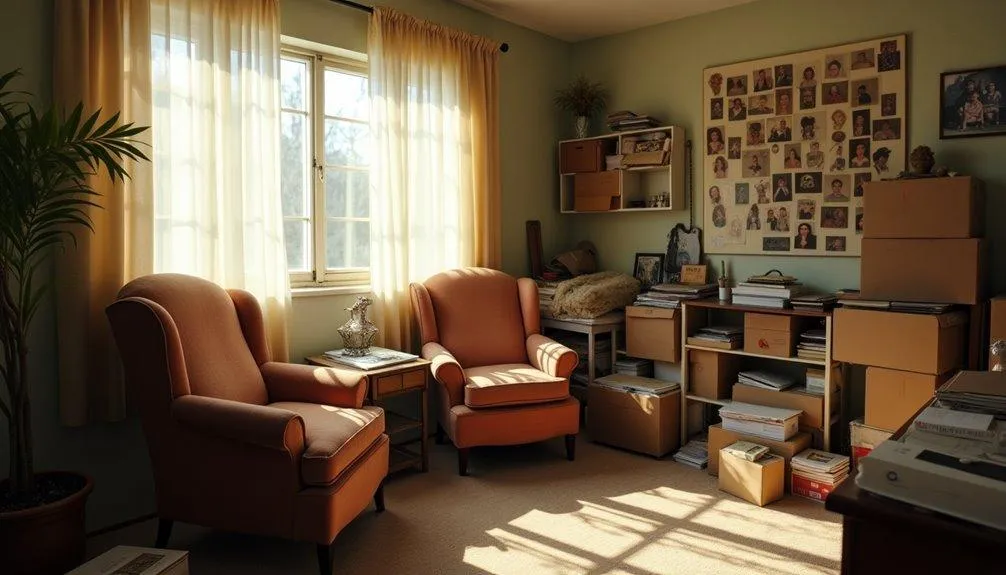
Recognizing the Signs: When It’s Time for Your Parents to Downsize
When it comes to your parents’ living situation, recognizing the signs that it may be time for them to downsize is essential for their health and happiness. Are they struggling with mobility, finding household tasks overwhelming, or feeling isolated in their current home? These indicators can signal the need for a more manageable space that supports their lifestyle. Understanding these factors can lead to important conversations about their future and well-being. What steps can you take to facilitate this change?
Key Takeaways
Limited mobility and difficulty navigating stairs or daily tasks indicate a need for a more accessible living environment.
Increased isolation and avoidance of social gatherings suggest emotional distress that could be alleviated by downsizing to a supportive community.
Struggles with household chores and reliance on others for help may signal an overwhelming living situation requiring a simpler home.
Financial strain from high maintenance costs, utility bills, and repairs often makes downsizing a practical solution for a manageable lifestyle.
Safety concerns in the current home, such as hazards and layout issues, highlight the necessity for a more secure living space.
Limited Mobility and Physical Challenges

As you observe your parents’ daily routines, it’s essential to reflect on how limited mobility and physical challenges might be affecting their quality of life.
You may notice them struggling with stairs, finding it difficult to get in and out of the car, or needing assistance with daily tasks. These challenges can lead to frustration, isolation, and a diminished sense of independence.
It’s vital to recognize that their inability to navigate their environment safely can impact their overall well-being. You might want to take into account how a more accessible living situation could enhance their comfort and security.
Downsizing to a single-level home or a community with supportive services could greatly improve their daily experiences and reconnect them with a vibrant, engaging lifestyle.
Safety Concerns in the Current Home
Limited mobility can often expose hidden safety concerns in your parents’ current home, making it important to assess their living environment closely.
Look for potential hazards like loose rugs, cluttered walkways, or inadequate lighting, which can increase the risk of falls. Check if handrails and grab bars are installed in necessary areas, such as stairs and bathrooms; these features can greatly enhance safety.
Additionally, verify that frequently used items are easily accessible, reducing the need for risky reaching or bending. Evaluate the layout of their home; narrow hallways or steep stairs might pose challenges.
Addressing these safety concerns not only protects your parents but also fosters their independence, allowing them to navigate their daily routines with greater confidence and security.
Increased Isolation and Loneliness

While your parents may cherish their independence, the reality of increased isolation and loneliness can weigh heavily on their emotional well-being.
If you notice them spending more time alone, avoiding social gatherings, or expressing feelings of sadness, these signs warrant attention. As friends and family members age, their social networks often shrink, making it harder to maintain connections.
This isolation can lead to severe emotional distress, affecting their overall health. Encouraging regular outings, arranging visits, or introducing them to community groups can help combat loneliness.
If these efforts don’t seem to make a difference, it might be time to reflect on a home that’s more conducive to social interaction, ensuring they stay engaged and connected in their golden years.
Financial Strain and Maintenance Costs
When you start noticing that your parents are struggling to keep up with their home’s financial demands, it’s essential to take a closer look at their situation. High utility bills, property taxes, and unexpected maintenance costs can quickly add up, creating significant stress.
If they’re constantly worrying about affording these expenses, it may be a sign that their current home is no longer manageable. You might also see them delaying repairs or avoiding necessary upkeep due to financial constraints.
Consider whether their large house is worth the strain on their budget. Downsizing to a smaller, more affordable living space can’t only alleviate this financial burden but also provide them with a more manageable lifestyle, allowing them to enjoy their golden years.
Difficulty Managing Household Tasks

As your parents age, you might notice that they’re struggling to keep up with everyday household tasks, which can be a strong indicator that it’s time to contemplate downsizing.
Simple chores, like cleaning, cooking, or even managing laundry, may become overwhelming. You might find them forgetting to take out the trash or struggling to organize their spaces, leading to clutter. If they’re relying on you or others for help more frequently, it’s a sign they’re having difficulty.
Additionally, safety hazards, such as unkempt yards or untidy living areas, can pose risks to their well-being. Recognizing these signs early can help you initiate a conversation about their living situation, ensuring they maintain a safe and manageable environment that supports their needs.
Changes in Lifestyle and Daily Routines
Changes in lifestyle and daily routines can often signal a need for your parents to contemplate downsizing their living situation.
If you notice they’re spending less time engaging in hobbies or social activities they once loved, it could indicate they’re feeling overwhelmed by their current space.
Additionally, if they’ve started relying more on you for daily tasks, like grocery shopping or meal preparation, that might be a sign their home is becoming less manageable.
You might also see changes in their physical activity levels; if they avoid stairs or struggle with yard work, a smaller, more accessible home could enhance their quality of life.
Recognizing these shifts can help you support them in making thoughtful decisions about their living arrangements.
The Burden of Excessive Clutter

Excessive clutter can become a significant burden for your parents, often leading to feelings of stress and anxiety as they navigate their day-to-day lives.
Excessive clutter can weigh heavily on your parents, causing stress and anxiety in their everyday lives.
You might notice they struggle to find essential items, which can further aggravate their frustrations. Piles of unused belongings can limit their mobility, making it difficult to move safely around their home.
This environment not only affects their physical well-being but can also impact their mental health, as the overwhelming mess serves as a constant reminder of tasks left undone.
Encouraging them to declutter can lighten their load, promoting a sense of accomplishment. By addressing the clutter, you can help them regain control over their living space, ultimately fostering a more peaceful and enjoyable home environment.
Desire for a Supportive Community Environment
A supportive community environment plays an essential role in enhancing the quality of life for your parents as they navigate their later years. When they’re surrounded by friendly neighbors and engaging activities, it can greatly boost their mental and emotional well-being.
Consider communities that offer social events, fitness classes, or hobby groups, allowing your parents to forge new friendships and maintain an active lifestyle. Additionally, proximity to essential services—like healthcare and grocery stores—ensures they can remain independent and safe.
Bottom Line
In summary, recognizing the signs that your parents may need to downsize is essential for their safety and well-being. By paying attention to their mobility challenges, safety concerns, and emotional health, you can help them shift to a more suitable living environment. This change not only enhances their quality of life but also fosters a sense of community and support. Ultimately, taking these steps guarantees they can enjoy their golden years with dignity and comfort.


